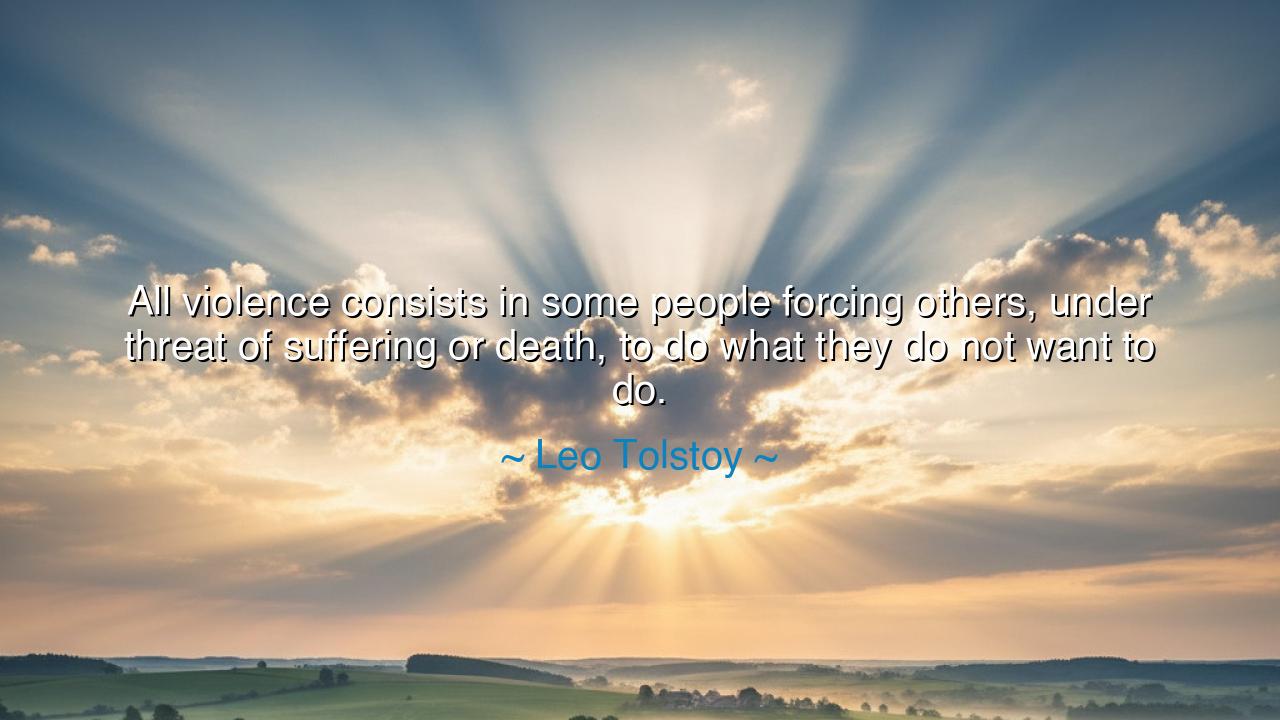
All violence consists in some people forcing others, under threat
All violence consists in some people forcing others, under threat of suffering or death, to do what they do not want to do.






In the twilight of reflection, Leo Tolstoy’s words stand like a monolith of truth: “All violence consists in some people forcing others, under threat of suffering or death, to do what they do not want to do.” Though simple in form, these words are carved from the deepest understanding of human nature and power. They are the cry of one who had seen empires command obedience, armies march in arrogance, and the innocent bow beneath the shadow of fear. From the soil of nineteenth-century Russia—where serfs toiled and kings decreed—Tolstoy drew this truth, as eternal as the struggle between conscience and compulsion.
In his view, violence was not merely the clash of swords or the thunder of guns. No, it was the quiet domination of will over will, the act of bending another soul beneath one’s own desire. For whenever one human being is forced—not persuaded, not taught, but threatened—there, Tolstoy saw the seed of every tyranny. He beheld in that act the origin of all wars, all injustice, all cruelty disguised as law. And in his heart burned a vision: that humanity, if it would ever know peace, must reject not only the sword, but the very spirit of coercion.
This wisdom is ancient, echoing through the ages like the voice of a prophet. Remember the tale of Socrates, who refused to flee his execution though he knew the verdict unjust. When the Athenian court sought to make him renounce his truth under threat of death, he chose instead to drink the hemlock. In that moment, he taught a lesson that outlived empires: that the soul’s freedom is greater than the body’s safety. Violence, Tolstoy would say, is the hand that holds the cup to another’s lips and demands obedience; but peace, true peace, is found in the courage to say no—even when death stands near.
And yet, how often have nations wrapped violence in noble cloth, calling it duty, progress, or defense? Kings have sent men to die in wars they did not understand; tyrants have silenced poets in the name of order; even ordinary hearts have turned to cruelty, convincing themselves it was necessity. Tolstoy saw through these veils. He declared that the root of all evil is not hatred, but compulsion—the belief that one has the right to control another’s will by fear. This was his rebellion against the very logic of his time, when empires believed their survival justified their cruelty.
Consider also the example of Mahatma Gandhi, who, though born decades after Tolstoy’s awakening, became the living echo of his teaching. Gandhi corresponded with Tolstoy and was inspired by his call to nonviolence, or ahimsa. In leading India’s struggle for freedom, Gandhi refused to answer oppression with the sword. He wielded instead the power of moral courage. When beaten, he stood; when imprisoned, he prayed; when threatened, he forgave. His victory was not merely political—it was spiritual, for he proved that force of conscience is mightier than force of arms.
The lesson for us, then, is not confined to the realms of politics or history. It is a truth for every soul that walks the earth. Each time we use anger, shame, or fear to bend another to our will, we walk the same path as the conqueror and the tyrant. And each time we choose empathy, persuasion, or love, we walk the path of the sages. To reject violence is not to be weak—it is to stand firm in the belief that freedom of spirit is sacred, that no good thing can grow from the soil of fear.
Therefore, let us resolve to live without forcing others to our will. Let us speak truth, but never with the lash of threat. Let us guide, but never with the chain of guilt. Let us lead, but with humility, knowing that every soul is its own kingdom, not ours to command. For in this lies the heart of Tolstoy’s teaching: that peace begins not in treaties or thrones, but in the quiet refusal to coerce, the steadfast choice to respect the divine will within another.
And so, dear listener, let this wisdom be your torch. Wherever you stand—whether in the field of work, the hearth of home, or the battle of ideals—remember: to force is to destroy, but to understand is to heal. In the end, the mightiest power is not the hand that commands, but the heart that listens.






AAdministratorAdministrator
Welcome, honored guests. Please leave a comment, we will respond soon